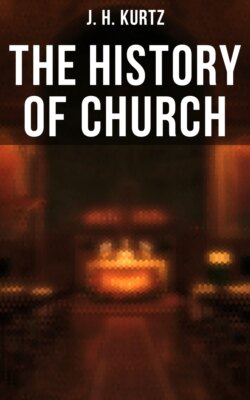Читать книгу The History of Church - J. H. Kurtz - Страница 36
На сайте Литреса книга снята с продажи.
§ 31. The Theological Literature of the Old Catholic Age, A.D. 170–323.
ОглавлениеFrom about A.D. 170, during the Old Catholic Age, scientific theology in conflict with Judaizing, paganizing and monarchianistic heretics progressed in a more vigorous and comprehensive manner than in the apologetical and polemical attempt at self-defence of Post-Apostolic Times. Throughout this period, however, the zeal for apologetics continued unabated, but also in other directions, especially in the department of dogmatics, important contributions were made to theological science. While these developments were in progress, there arose within the Catholic church three different theological schools, each with some special characteristic of its own, the Asiatic, the Alexandrian, and the North African.
§ 31.1. The Theological Schools and Tendencies.—The School of Asia Minor was the outcome of John’s ministry there, and was distinguished by firm grasp of scripture, solid faith, conciliatory treatment of those within and energetic polemic against heretics. Its numerous teachers, highly esteemed in the ancient church, are known to us only by name, and in many cases even the name has perished. Only two of their disciples resident in the West—Irenæus and Hippolytus—are more fully known. A yet greater influence, more widely felt and more enduring, was that of the Alexandrian School.70 Most of its teachers were distinguished by classical culture, a philosophical spirit, daring speculativeness and creative power. Their special task was the construction of a true ecclesiastical gnosis over against the false heretical gnosis, and so the most celebrated teachers of this school have not escaped the charge of unevangelical speculative tendencies. The nursery of this theological tendency was especially this Catechetical School of Alexandria which from an institution for the training of educated Catechumens had grown up into a theological seminary. The North African School by its realism, a thoroughly practical tendency, formed the direct antithesis of the idealism and speculative endeavours of the Alexandrian. It repudiated classical science and philosophy as fitted to lead into error, but laid special stress upon the purity of Apostolic tradition, and insisted with all emphasis upon holiness of life and strict asceticism.—Finally, our period also embraces the first beginnings of the Antiochean School, whose founders were the two presbyters Dorotheus and Lucian. The latter especially gave to the school in its earlier days the tendency to critical and grammatico-historical examination of scripture. At Edessa, too, as early as the end of the 2nd century, we find a Christian school existing.
